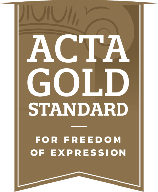
Campus Freedom Initiative™
Free expression is the necessary precondition for the unfettered search for truth on the college campus.
ACTA’s Virginia Report Card
Virginia’s public universities should be leaders in promoting free expression and diversity of thought, but new research from ACTA’s Campus Freedom Initiative™ (CFI) shows the state’s most important public universities have serious work to do to make their campuses welcoming to new ideas and different points of view. We surveyed over 2,300 students and recent alumni from George Mason University (GMU), James Madison University (JMU), the University of Virginia (UVA), Virginia Commonwealth University (VCU), Virginia Tech (VT), and William & Mary (W&M). Our survey found high levels of self-censorship and intellectual intolerance on each campus.
CFI’s Virginia Report Card evaluates these six public universities against our Gold Standard for Freedom of Expression™, identifying several steps they can take to promote open inquiry and the free exchange of ideas. Depending on the university, our recommendations include adopting institutional neutrality, supporting academic centers dedicated to free inquiry and intellectual diversity, making intellectual diversity a stated goal in faculty hiring, requiring free expression training for administrative staff, and requiring regular institutional research on the campus climate for free expression. By implementing our Gold Standard recommendations, these universities can transform Virginia’s public system of higher education into a model for the nation.
 ACTA Gold Standard for Freedom of Expression™
ACTA Gold Standard for Freedom of Expression™| COMMIT TO A CULTURE OF FREE EXPRESSION | W&M | GMU | UVA | VCU | VT | JMU |
|---|---|---|---|---|---|---|
| Adopt the Chicago Principles on Freedom of Expression or a similarly strong statement. | No evidence of W&M adopting the Chicago Principles or a similar statement could be found. | No evidence of VCU adopting the Chicago Principles or a similar statement could be found. | No evidence of JMU adopting the Chicago Principles or a similar statement could be found. | |||
| Establish clear expectations regarding free expression in student and faculty handbooks and codes of conduct. | VCU’s faculty handbook meets this measure. The university’s student code of conduct does not meet this measure | |||||
| Include a free expression unit in new-student orientations. | Virginia state law requires public universities to offer such training. No materials showing UVA’s compliance could be found. Requests to university officials for such materials remain unanswered. | Virginia state law requires public universities to offer such training. No materials showing VCU’s compliance could be found. Requests to university officials for such materials remain unanswered. | ||||
| Protect the diversity of political viewpoints by adopting an institutional neutrality policy such as the Kalven Report. | No evidence of W&M adopting an institutional neutrality policy could be found. The university’s policy on leadership communication is insufficient to meet this measure. | No evidence of VT adopting an institutional neutrality policy could be found. | No evidence of JMU adopting an institutional neutrality policy could be found. | |||
| FOSTER CIVIL DISCOURSE | W&M | GMU | UVA | VCU | VT | JMU |
| Sponsor campus debates that model civil discourse. | No evidence showing that VCU regularly sponsors such events could be found. | No evidence showing VT regularly sponsors such events could be found. | JMU has offered programming consistent with this measure in the past, but such programming does not appear to be active and ongoing. | |||
| Promote free expression by encouraging the establishment of student groups devoted to free expression, civil discourse, or representing a plurality of perspectives. | No evidence that such groups exist at VCU could be found. There is a clear ideological imbalance in VCU’s student groups. | |||||
| Establish policies that protect free expression rights on campus and set clear consequences for disruption of sponsored speakers, events, and classes. | VCU’s policies meet this measure. VCU’s actions—for example, concerning the 2023 disruption of Kristan Hawkins—do not meet this measure. | |||||
| Enforce policies that protect free expression rights on campus and apply clear consequences for disruption of sponsored speakers, events, and classes. | UVA has policies that meet the establishment component of this measure, yet the university’s handling of an encampment in 2024 failed to meet the enforcement component of this measure. | |||||
| Cultivate Intellectual Diversity | W&M | GMU | UVA | VCU | VT | JMU |
| Encourage presidents, provosts, and deans to model respect for a broad range of viewpoints. | ||||||
| Guarantee that viewpoint diversity is reflected in student life policies and practices. | No evidence that meets this measure could be found. The Residence Life department emphasizes DEI in its mission and values. | VCU’s student life policies contain elements that could undermine free speech and viewpoint diversity. | Some VT materials contain language likely to chill speech and expression of different views. | JMU’s student life policies contain elements that undermine free speech and viewpoint diversity. | ||
| Support academic centers dedicated to free inquiry and intellectual diversity. | No evidence of W&M supporting such centers could be found. | No evidence of GMU supporting such centers could be found. | No evidence of VCU supporting such centers could be found. | No evidence of VT supporting such centers could be found. | ||
| Ensure faculty hiring, evaluation, and promotion processes are based on merit and make clear that the institution is open to intellectual diversity. | There is no evidence of a university-wide effort at W&M on these issues. | There is no evidence of a university-wide effort at GMU on these issues. The university is under investigation for allegedly engaging in illegal discrimination in faculty hiring. | There is no evidence of a university-wide effort at UVA on these issues. | There is no evidence of a university-wide effort at VCU on these issues. | There is no evidence of a university-wide effort at VT on these issues. | There is no evidence of a university-wide effort at JMU on these issues. |
| Break Down Barriers to Free Expression | W&M | GMU | UVA | VCU | VT | JMU |
| Eliminate speech and IT policies that have a chilling effect on free expression. | Policies related to this measure have elements likely to chill free expression. | Policies related to this measure have elements likely to chill free expression. | ||||
| Ensure that enforcement of Title VI, Title VII, and Title IX does not infringe on free expression. | ||||||
| Disband bias response teams. | Administrators have discussed disbanding GMU’s bias response team, but no action has been taken. | |||||
| Review student government policies to ensure viewpoint neutrality in student group recognition and funding. | There is no evidence W&M has discriminated against student groups on the basis of viewpoint, but no clear statement prohibiting such discrimination could be found. | No evidence that meets this measure could be found. GMU is gathering materials to facilitate further analysis of this measure. | There is no evidence UVA has discriminated against student groups on the basis of viewpoint, but no clear statements prohibiting such discrimination could be found in our research or in materials supplied by university officials. | Policies contain no explicit requirement to uphold viewpoint neutrality. The narrow ideological range of VCU student groups raises questions about this measure. | No materials showing VT’s compliance could be found. Requests to university officials for such materials remain unanswered. | There is no evidence JMU has discriminated against student groups on the basis of viewpoint, but no clear statement prohibiting such discrimination could be found. |
| Advance Leadership Accountability | W&M | GMU | UVA | VCU | VT | JMU |
| Include commitments to free expression in mission statements, values statements, strategic plans, and other key institutional documents. | Evidence that GMU meets this measure is insufficient. | Evidence that UVA meets this measure is insufficient. | No substantive evidence meeting this measure could be found in VCU’s bylaws, mission statements, or current strategic plan. | Evidence that VT meets this measure is insufficient. | No substantive evidence that meets this measure could be found in JMU’s bylaws, mission statements, or current strategic plan. | |
| Include a commitment to free expression as a criterion in searches and evaluations for presidents, provosts, and deans. | No such commitment was made during W&M’s most recent presidential search. A commitment to “diversity and inclusion” was listed as the most important qualification. | In its most recent presidential search, GMU identifies freedom of expression and thought as university values, but it does not include a commitment to these values in the description of the minimum qualifications for a successful candidate. In contrast, the minimum qualifications do include a commitment to DEI. | No such commitment was made during UVA’s most recently completed presidential search. | No such commitment was made during VCU’s most recent presidential search. | No such commitment was made during VT’s most recent presidential search. | No such commitment was made during JMU’s most recent presidential search. Promoting “a diverse and inclusive community” was described as a key priority in that search. |
| Require free expression and viewpoint diversity training for administrative staff. | No evidence that meets this measure could be found. GMU is gathering materials to facilitate further analysis of this measure. | No materials showing UVA meets this measure could be found. Requests to university officials for such materials remain unanswered. | Contact with VCU staff indicates no such training is offered. | Contact with VT staff indicates no such training is offered. | No evidence that meets this measure could be found. | |
| Conduct regular surveys or other quantitative studies of students and faculty to assess the state of free expression and intellectual diversity on campus. | No evidence that GMU conducts this type of research could be found. | No evidence that UVA conducts this type of research could be found. | No evidence that VCU conducts this type of research could be found. | No evidence that VT conducts this type of research could be found. | No evidence that JMU conducts this type of research could be found. |
Our survey of 2,345 students and recent alumni from George Mason University (GMU), James Madison University (JMU), the University of Virginia (UVA), Virginia Commonwealth University (VCU), Virginia Tech (VT), and William & Mary (W&M) reveals high rates of self-censorship and intolerance for intellectual and political differences. Explore the full survey report to learn more.
View Survey Results68
%of students in Virginia believe professors should be reported to the university for making comments students find offensive.
43
%of students in Virginia said they would feel uncomfortable expressing their views on a controversial subject during an in-class discussion.
79
%of students in Virginia say they have not received training on campus free expression policies, despite a state law requiring public universities to provide such training.

Launched in 1995, we are the only organization that works with alumni, donors, trustees, and education leaders across the United States to support liberal arts education, uphold high academic standards, safeguard the free exchange of ideas on campus, and ensure that the next generation receives an intellectually rich, high-quality college education at an affordable price.
Discover MoreSign up to receive updates on the most pressing issues facing our college campuses.